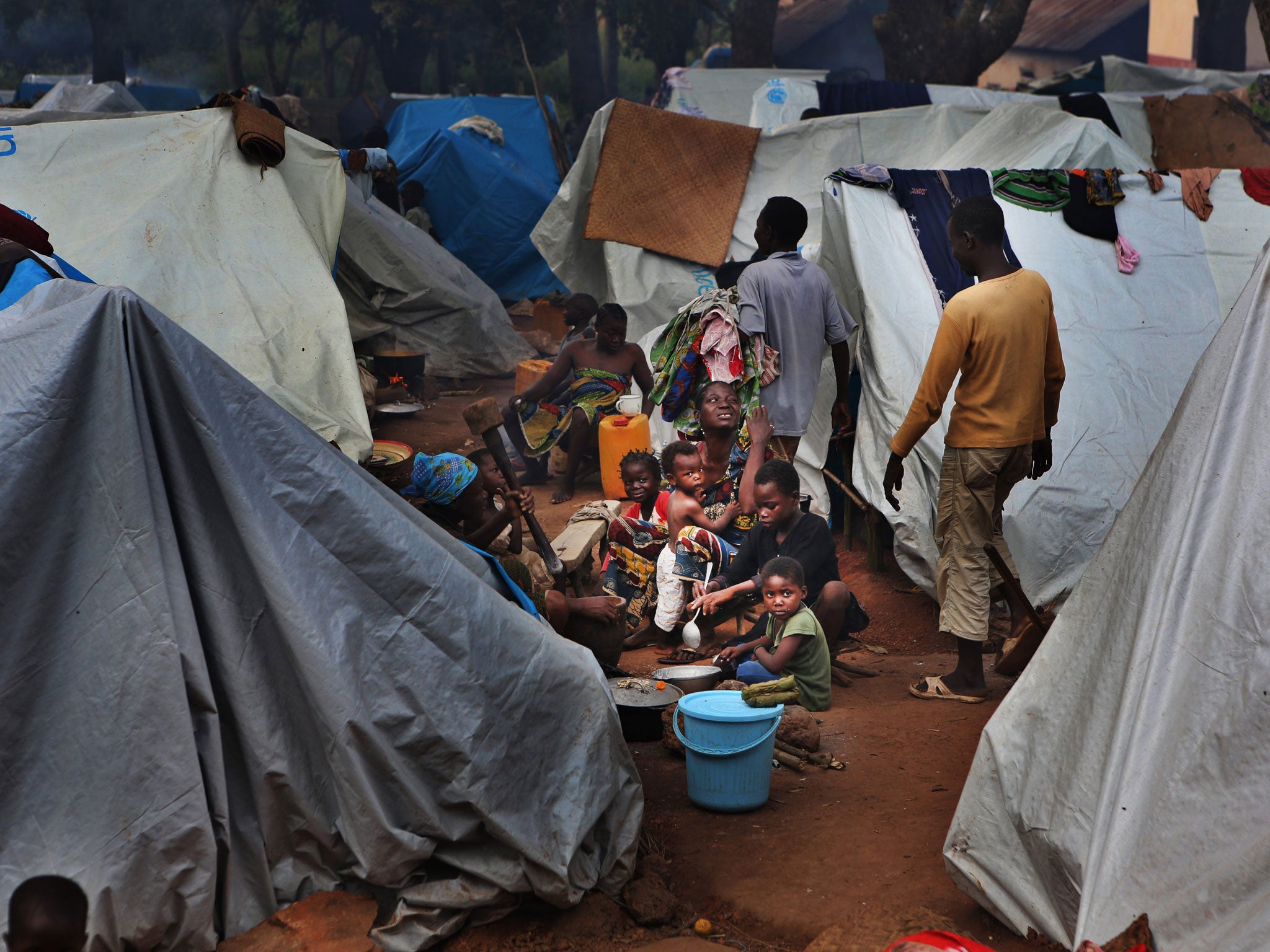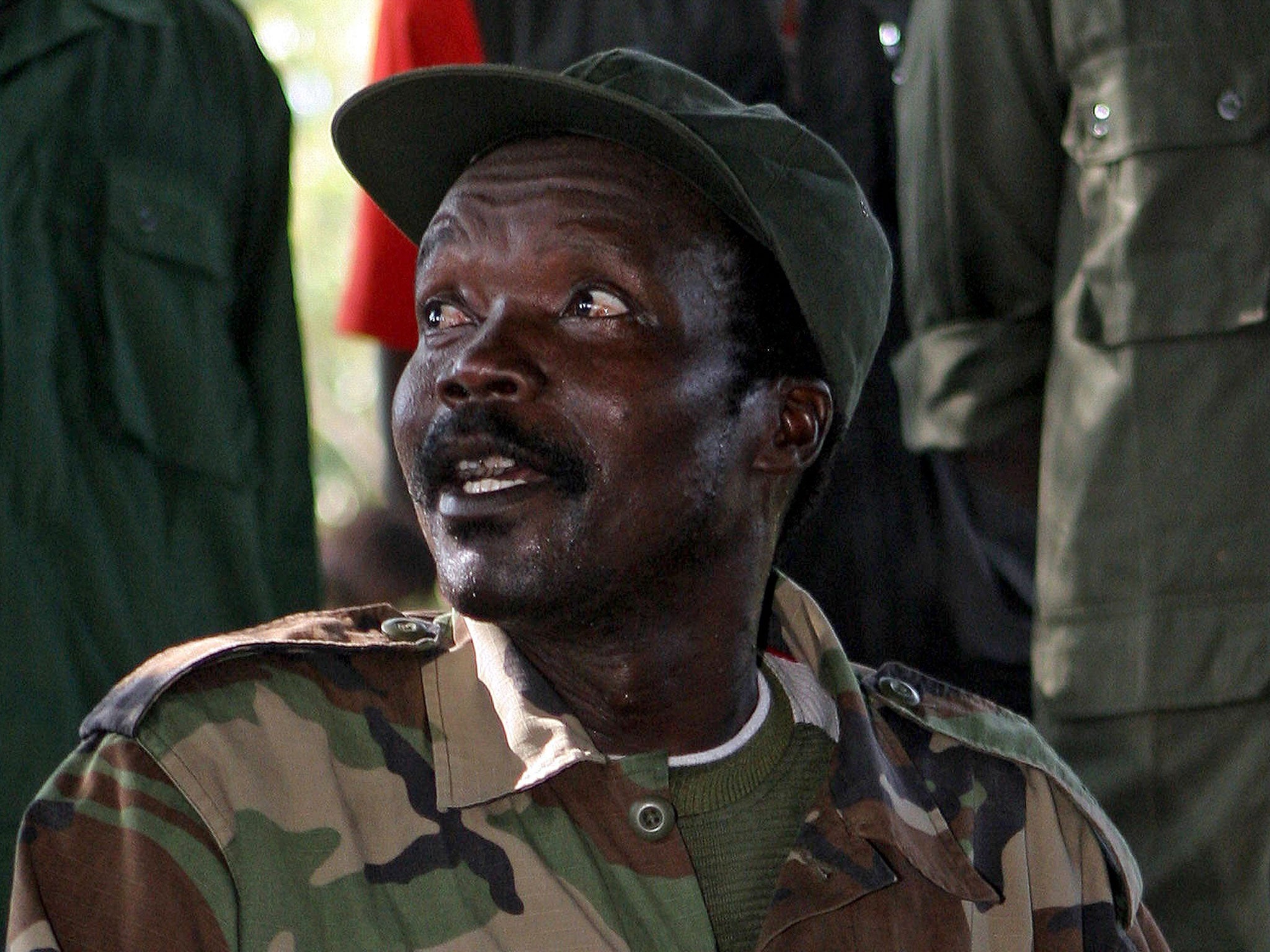France warns that the Central African Republic is 'on the verge of genocide'
Dire predictions of crisis in the landlocked nation come amid reports that the fugitive warlord Joseph Kony is ready to surrender

Your support helps us to tell the story
From reproductive rights to climate change to Big Tech, The Independent is on the ground when the story is developing. Whether it's investigating the financials of Elon Musk's pro-Trump PAC or producing our latest documentary, 'The A Word', which shines a light on the American women fighting for reproductive rights, we know how important it is to parse out the facts from the messaging.
At such a critical moment in US history, we need reporters on the ground. Your donation allows us to keep sending journalists to speak to both sides of the story.
The Independent is trusted by Americans across the entire political spectrum. And unlike many other quality news outlets, we choose not to lock Americans out of our reporting and analysis with paywalls. We believe quality journalism should be available to everyone, paid for by those who can afford it.
Your support makes all the difference.France has warned that the Central African Republic is “on the verge of genocide” amid escalating violence between Christians and Muslims and a humanitarian crisis.
The landlocked nation has descended into near-anarchy since the Seleka, a largely Muslim coalition of rebels, ousted President François Bozizé in March. Thousands of people have been killed, abducted or fled their homes amid the burning of villages in what some say is the worst violence CAR has ever seen.
“The country is on the verge of genocide,” the French Foreign Minister Laurent Fabius told French television station France 2. “France, CAR’s neighbours and the international community are worried. The United Nations will give permission to African forces, the African Union and France to intervene.”
His dire predictions come amid reports that CAR’s government, failing to keep a lid on its own troubles, is in talks with Joseph Kony, the fugitive warlord of the Lord’s Resistance Army, to surrender after more than two decades on the run.
Mr Fabius’s warnings echo those of the United Nations and other agencies in recent days, with the UN chief Ban Ki-moon calling for the urgent deployment of 6,000 UN peacekeepers to the diamond-rich country to bolster a force of 2,500 African soldiers that has proved largely ineffectual in curbing the violence. The UN Security Council is to vote next month on whether to dispatch UN and French troops to the strife-torn country. The US, though, has been more cautious in its assessment, terming the situation in CAR as “pre-genocidal”. It has pledged $40m (£25m) to bolster the African troops there, saying it does not yet see the need for UN peacekeepers.
Since the Seleka overthrew the government in March and installed its leader, Michel Djotodia, as interim President, the transitional authority has failed to prevent a slide towards anarchy and conflict that has taken on an increasingly sectarian hue.
Muslim former rebels have been accused of murder, kidnap, rape, looting and the burning of villages, resulting in mass displacement. Christian vigilante militias, sometimes referred to as anti-balaka (translated as “anti-machete”), have been formed in self-defence. Some 100 people were killed in Muslim-Christian clashes in September.
Muslims make up between 10 and 20 per cent of the population in the predominantly Christian country.
Speaking at the UN Security Council earlier this week, Mr Ban warned that the CAR was heading towards more bloodshed.
“This cycle, if not addressed now, threatens to degenerate into a country-wide religious and ethnic divide, with the potential to spiral into an uncontrollable situation, including atrocity crimes,” the UN chief warned.
Human rights groups have accused both sides of serious abuses. Human Rights Watch researchers documented the torching of Camp Bangui, a small town, on 10 November, describing how a local military commander massed forces to move in on the Christian militia. When HRW staff reached the town a few days later, they found it “totally destroyed”. Most of the houses had been burnt down, and all of them looted, and their occupants had fled to the bush. Survivors said the Seleka was responsible for the devastation.
Although Mr Djotodia formally disbanded the Seleka in September in what appeared to be an effort to distance himself from them amid widespread abuses, many were integrated into the new army, and agencies say command and control remains unclear.
In the wake of the violence, thousands of civilians have been left without access to food or healthcare and the security situation has prevented aid agencies from working effectively. All but a few doctors have fled to the capital, Bangui.
“You have seven surgeons for a population of five million, an infant mortality rate of 25 per cent in some areas and 1.5 million people who have nothing, not even food, and armed gangs, bandits, etc,” Mr Fabius said.
Meanwhile, the CAR government has said it is in talks with Kony, the Ugandan-born warlord, who is said to want to give himself up. “Joseph Kony wants to come out of the bush. We are negotiating with him,” Mr Djotodia said during a meeting with political leaders in the capital Bangui. He added that the rebel, who is said to be hiding in CAR, had requested food supplies, and the government had complied.
Although such talks have been reported in the past, Kony is now said to be seriously ill according to UN and African Union envoys, and to have sought a safe zone in the CAR for him and his fighters, Abou Moussa, a UN special envoy, said this week.
Others are sceptical that the warlord, who is wanted by the International Criminal Court for war crimes and is being hunted by African forces, was considering surrender. “Many times in the past, Joseph Kony and his commanders have used any and every pretext to rest, regroup, and rearm, ultimately returning to kidnapping, killing, displacing and otherwise abusing civilian populations,” the US State Department said.
Enhanced efforts to track down the warlord have put considerable pressure on Kony, and there have been no significant raids by the LRA since the US joined efforts to find Kony over two years ago.
Kony, a Catholic altar boy in his youth, is one of Africa’s most sinister and bizarre figures. The LRA, which began as a legitimate resistance movement to atrocities committed by the Ugandan government under Yoweri Museveni, has terrorised northern Uganda for decades, mutilating and killing civilians, and abducting children either to fight or serve as sex slaves. At the height of its influence, the LRA numbered thousands of combatants, women and children.

Claiming to be possessed and guided by spirits – among them an Italian First World War veteran, and an American called “Who are You?” – Kony says his aim is to overthrow the Ugandan government and rule the country by the Biblical Ten Commandments, none of which he has heeded himself.
After the LRA, thought by the UN to be responsible for more than 100,000 deaths, was driven out of Uganda in the mid-2000s, it continued to prey on civilian populations in Congo, the CAR and parts of what became South Sudan. Kony became a household name in the US overnight with the release last year of Kony 2012, a viral video by the advocacy group Invisible Children that has attracted over 100 million views.
While the makers of the video have been criticised for simplifying the conflict, and whitewashing the role of the Ugandan government that forced thousands into disease-ridden camps to cut off support for the LRA, the video has nevertheless focused US attention on catching Kony.
A Ugandan-led African taskforce, buoyed by 100 military advisers from the US, is spearheading the search for the warlord, who is thought to have just 250 or so followers now, after a spate of defections. The US has placed a $5m bounty on this head, and individuals, among them an American charitable foundation, are also joining the hunt for Africa’s most elusive warlord. A Canadian film-maker intends to lead an expedition to rout the rebel leader next year.
If talks with Kony fail to result in his surrender, the warlord’s long experience in the bush could yet thwart even the most sophisticated tracking operation. “They have this image of being a rag-tag force led by a lunatic, but they are actually very skilled and disciplined fighters,” said Matthew Green, author of The Wizard of the Nile, the account of his search for Kony. “It might be possible to get him, but it won’t be easy.”
Join our commenting forum
Join thought-provoking conversations, follow other Independent readers and see their replies
Comments